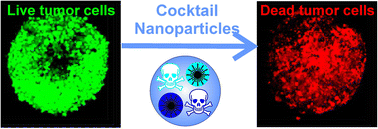Theranostic inorganic–organic hybrid nanoparticles with a cocktail of chemotherapeutic and cytostatic drugs†
Abstract
Theranostic inorganic–organic hybrid nanoparticles (IOH-NPs) with a cocktail of chemotherapeutic and cytostatic drugs and a composition Gd23+[(PMX)0.5(EMP)0.5]32−, [Gd(OH)]2+[(PMX)0.74(AlPCS4)0.13]2−, or [Gd(OH)]2+[(PMX)0.70(TPPS4)0.15]2− (PMX: pemetrexed, EMP: estramustine phosphate, AlPCS4: aluminum(III) chlorido phthalocyanine tetrasulfonate, TPPS4: tetraphenylporphine sulfonate) are presented for the first time. These IOH-NPs are prepared in water (40–60 nm in size) and have a non-complex composition with outstanding drug loading (71–82% of total nanoparticle mass) of at least two chemotherapeutic or a mixture of cytostatic and photosensitizing agents. All IOH-NPs show red to deep-red emission (650–800 nm) to enable optical imaging. The superior performance of the IOH-NPs with a chemotherapeutic/cytostatic cocktail is validated based on cell-viability assays and angiogenesis studies with human umbilical vein endothelial cells (HUVEC). The synergistic anti-cancer effect of the IOH-NPs with a chemotherapeutic cocktail is shown in a murine breast-cancer cell line (pH8N8) and a human pancreatic cancer cell line (AsPC1), whereas the synergistic cytotoxic and phototoxic efficacy is verified in response to illumination of HeLa-GFP cancer cells, MTT assays with human colon cancer cells (HCT116), and normal human dermal fibroblasts (NHDF). HepG2 spheroids as 3D cell cultures prove the effective uptake of the IOH-NPs with high uniform distribution and the release of the chemotherapeutic drugs with the strong synergistic effect of the cocktail of drugs.



 Please wait while we load your content...
Please wait while we load your content...